NPM Report: Behind the Walls of Kazakhstan’s Closed Facilities
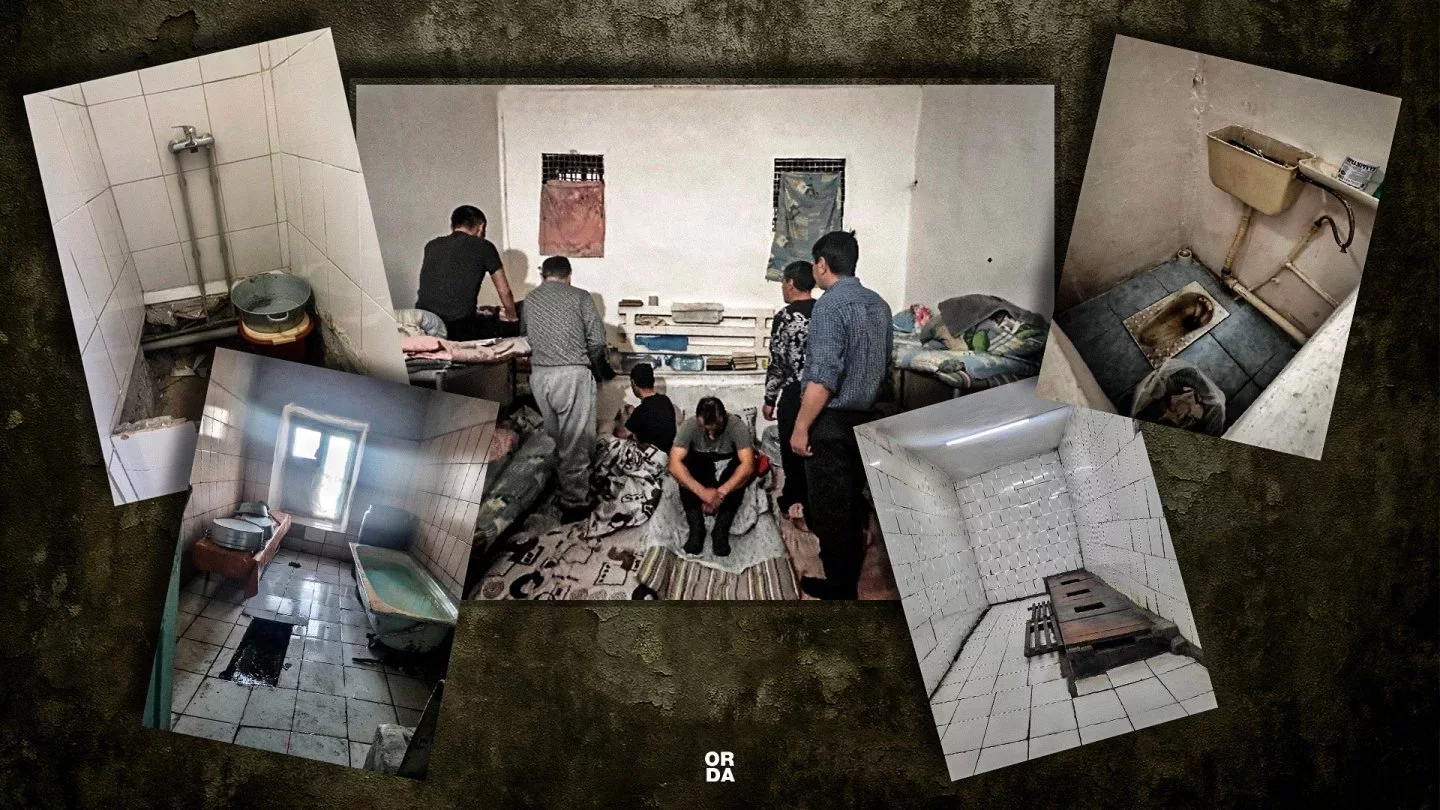 Photo: Orda.kz
Photo: Orda.kz
The National Preventive Mechanism (NPM) is the only organization in Kazakhstan whose members can enter prisons, psychiatric hospitals, boarding schools, and orphanages without prior notice. These visits are intended to monitor the treatment of individuals in closed state-run institutions — many of whom belong to socially vulnerable groups, including children.
The editorial team at Orda.kz has obtained the NPM’s 2024 report ahead of its official release on April 25. The document contains detailed accounts of torture, inhumane conditions, and gross human rights violations behind the walls of these facilities. From the extensive report, we've highlighted the most significant findings.
The National Preventive Mechanism was established in 2013, following Kazakhstan’s ratification of the UN Optional Protocol to the Convention Against Torture. Its mission is to prevent torture and cruel or degrading treatment in institutions where people are deprived of their liberty. The NPM operates under the coordination of the Ombudsman.
Although the NPM is funded by the state, it operates with a high degree of independence. Its members have the exclusive legal right to enter closed state institutions without notice, access information about them, check how many people are held there, and assess their living conditions—all with the aim of identifying human rights violations and preventing torture. However, not all facilities are aware of this mandate. In some cases, NPM members are still denied entry unless they receive approval from the administration, which is a violation of their rights.
Last year, NPM experts conducted nearly 500 unannounced visits to correctional institutions, pre-trial detention centers, special detention centers, juvenile adaptation centers, special educational institutions, family-type children's villages, boarding schools, child support centers, children's homes, psychiatric hospitals, tuberculosis clinics, drug addiction organizations of compulsory treatment and others.
Almost everywhere, visitors found dilapidated infrastructure and outdated equipment, unsanitary conditions, harsh living environments, ignored medical needs, and the lack of an adaptive environment for people with disabilities.
Moreover, people held in these institutions often have no real way to report abuse or raise concerns with the appropriate authorities. For example, during a visit to Institution No. 59, NPM representatives from the Jambyl region found ten terminals meant for submitting electronic complaints and applications — but not a single one was operational.
Women’s Prisons in Kazakhstan
Orda.kz has repeatedly reported on violence and human rights abuses in Kazakhstan’s prisons. According to the Penal Enforcement Committee (KUIS - Ed.), as of 2024, around 32,000 people are serving time in correctional facilities — more than 2,600 of them are women. Members of the NPM documented multiple cases of inhumane treatment during visits to these institutions, some of which amount to torture.
In one such case at Institution No. 46 in Pavlodar, a person with a third-degree disability described abuse by the head of educational work.
I have prosthetic legs and metal in my spine. I’ve had three strokes,the incarcerated person told NPM members.
During an argument, the incarcerated person reportedly swung his crutch at a prison officer, who responded by slamming him onto a bed, kneeling on him, and jumping on his body. The incident left the man partially paralyzed on one side and urinating blood. The Prosecutor General’s Office has taken the case under review.
At Facility No. 10 in Zhaugashty village, there is only one outdoor toilet for four units, each of which has 96 women. The facility is falling apart: broken, filthy, and infested. Inside the units, there’s one toilet, two sinks (often without running water), and a single shower stall for 96 people. Bathhouse capacity for the entire colony is just 15.
There is no hot water. The toilets are crawling with rats and worms, and the stench is unbearable,the report states.
There is also no regular access to medical care or necessary medications.
Overcrowding affects more than just women; some raise young children in these conditions. The prison is designed for 550 inmates but houses almost 100 more.
Pre-trial and Special Detention Facilities
According to NPM reports, many of the country’s 16 detention facilities are located in outdated buildings in poor condition — some dating back to the Stalin era. Most are overcrowded, poorly ventilated, dimly lit, and have unhygienic toilets, often without partitions. In some cases, detainees are even kept in basements. And across the board, the rights of people with disabilities are routinely violated.
None of the buildings have proper accommodations for mothers with newborns. In many facilities, children are held under the same harsh conditions as adults. Minors are frequently denied access to education, with no school psychologists available and no educational materials in the libraries.
At Pretrial Detention Center No. 69 in Shymkent, there isn’t a separate menu for minors. And what is on the menu often doesn’t reflect what’s actually served.
The menu listed rice soup with meat, buckwheat with meat sauce, and a tomato-cucumber salad. But there were no tomatoes or cucumbers. For lunch for those on a special diet, two or three chickens were boiled. One inmate sat by the pot of boiled chicken and chopped the meat to stretch those few chickens for everyone on a special diet.the NPM report states.
Inspectors found spoiled food in the same facility’s kitchen, insects crawling on surfaces, and unwashed dishes. Detainees there frequently go on hunger strikes, citing poor sanitary conditions, degrading treatment, and even torture by staff.
In the temporary detention facility in Mugalzhar district (Aqtobe region), overcrowding forces detainees to sleep on the floor despite the cells being designed for just four people.


At a special detention facility in Aqtobe, which houses administrative detainees, NPM members reported unhygienic conditions and the absence of even the most basic furniture.
There are no tables or chairs. Women eat their meals sitting on the floor on a sheet. This is a blatant violation of human rights, the experts wrote.
Ministry of Defense and National Security Committee Prisons: No Complaints
According to the NPM report, conditions in these facilities are significantly better than in most other places of detention.
For example, the prison for military offenders in Taldykorgan was recently renovated: new floors and beds were installed, walls and wiring were updated, and the facility now includes five modernized cells built to meet standards for detaining military personnel.
A separate cell is designated for women, one for offenders from the officer corps, and another for non-commissioned officers. Each cell holds two people and has wooden beds and individual nightstands.
However, there are no sinks or stationary toilets in the cells for detainees.
Still, the facility features a fully equipped room for reheating food that resembles a home kitchen. It includes cabinets, a sink, refrigerator, microwave, dishes, a table, and chairs.
Steady Improvements for Orphans
Meanwhile, conditions in family-type children’s villages — institutions for orphans and children without parental care — have been gradually improving, according to the NPM.
Children live in small groups with caregivers in separate cottages, participating in daily chores like cleaning, cooking, and gardening. They're integrated, attending regular schools, joining city clubs, and participating in sports programs.
Most facilities are built as cottage-style towns, with each group housed in its own private building.
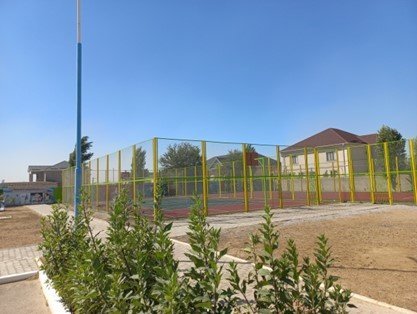
All houses are fully equipped with furniture, appliances, and kitchen utensils. They have internet, cable, or satellite TV. Each child has their place to study.


According to the authors of the NPM report, while children in orphanages live in generally acceptable conditions, they are still far from ideal. Inspectors documented chronic underfunding, overcrowding, poor nutrition, and unsanitary kitchen conditions.
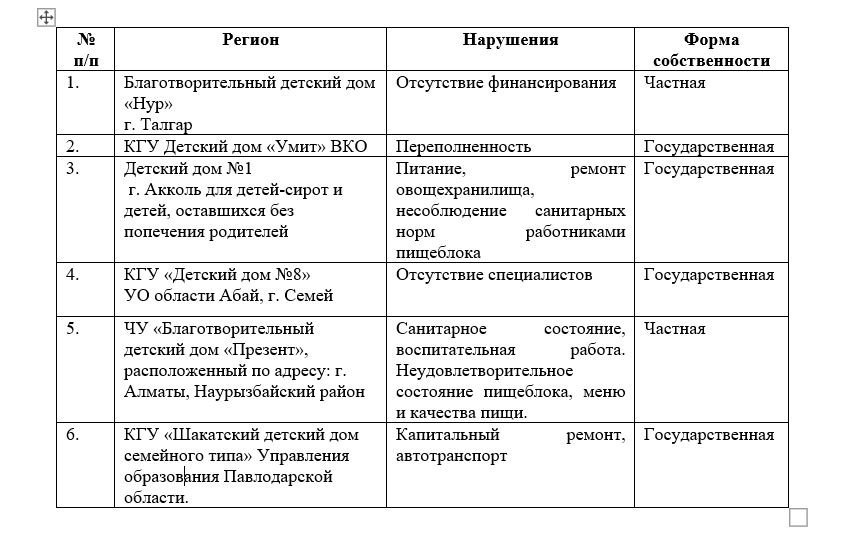
One such case was a private family-type orphanage called Perzent in Almaty, which is housed in what used to be the Seimar poultry farm's office building. Although such institutions are supposed to offer a home-like environment, this one resembled anything but.
Every window on the three-story building was barred, and inside, conditions were unhygienic—dirty, musty bed linens, foul-smelling toilets, and a general state of neglect.


When the NPM experts visited, the children were served instant noodles for breakfast. In the vegetable storage area, rotting apples and vegetables were strewn across the floor.
Inspectors also raised serious concerns about the children’s over-involvement in religious practices. All children were reportedly required to pray five times a day. A building used for prayer sits on the property, but from the outside, it’s impossible to determine what religious denomination it belongs to.
The children were all dressed alike, erasing their individuality and personal identity.
The NPM also discovered that the orphanage director had sole control over all the bank accounts where state social payments were deposited. The children had no access to or control over these funds.
Following the visit, the NPM alerted the Almaty Region Prosecutor’s Office and the local National Security Committee to initiate an official investigation into the orphanage and its administration.
The report also touches on the state of Youth Houses, facilities intended to support young people aging out of orphanages and help them adapt to independent life. Experts visited seven such centers.
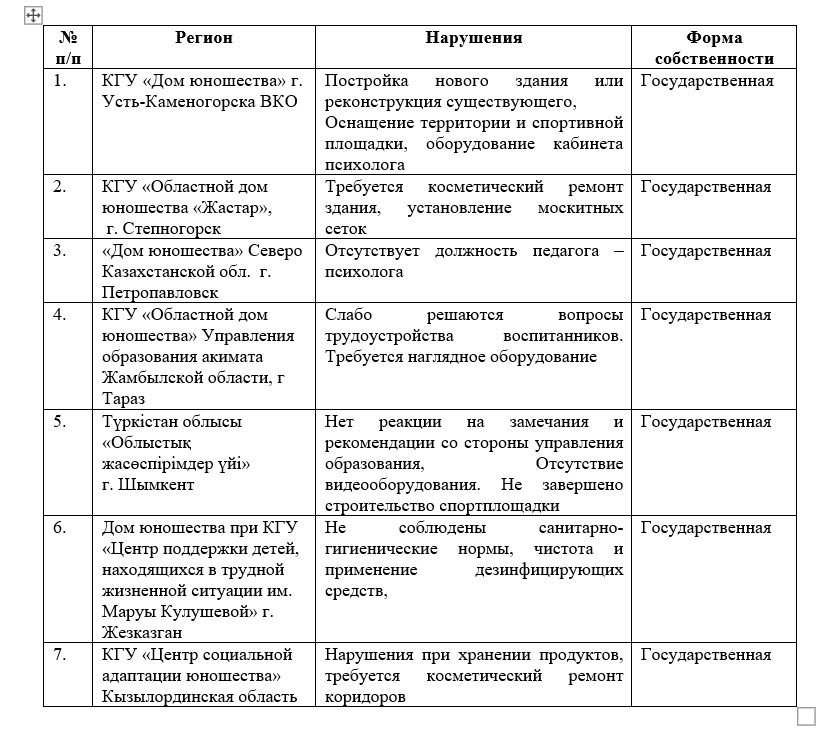
At the Youth House in Oskemen, they found eight young residents with mental disabilities — even though the organization’s guidelines clearly state that it is not equipped to care for people with such conditions.
According to the report, housing these children in an unsuitable environment could harm the emotional well-being of other residents.


According to the latest NPM report, the conditions in special educational institutions for children with behavioral challenges are deeply troubling.
One particularly stark example was found in a facility in Almaty, where inspectors documented an extensive list of violations:
- Dirty, unsanitary toilets that appeared to have been neglected for a long time
- No access to hot water
- Shower stalls without curtains or shelves for toiletries
- A bathroom door was swollen from moisture and didn’t close properly
- Bedroom doors were broken and wouldn’t shut
- All wardrobes in the girls’ dormitory were damaged
- No curtains in the bedrooms
- Poor-quality, greyed bed linens
- Sports areas were unequipped and unusable
- NPM information boards and emergency contact numbers hadn’t been updated
The report notes that conditions in some boarding schools are even worse. In many of these institutions, administrators routinely disregard the NPM’s recommendations.
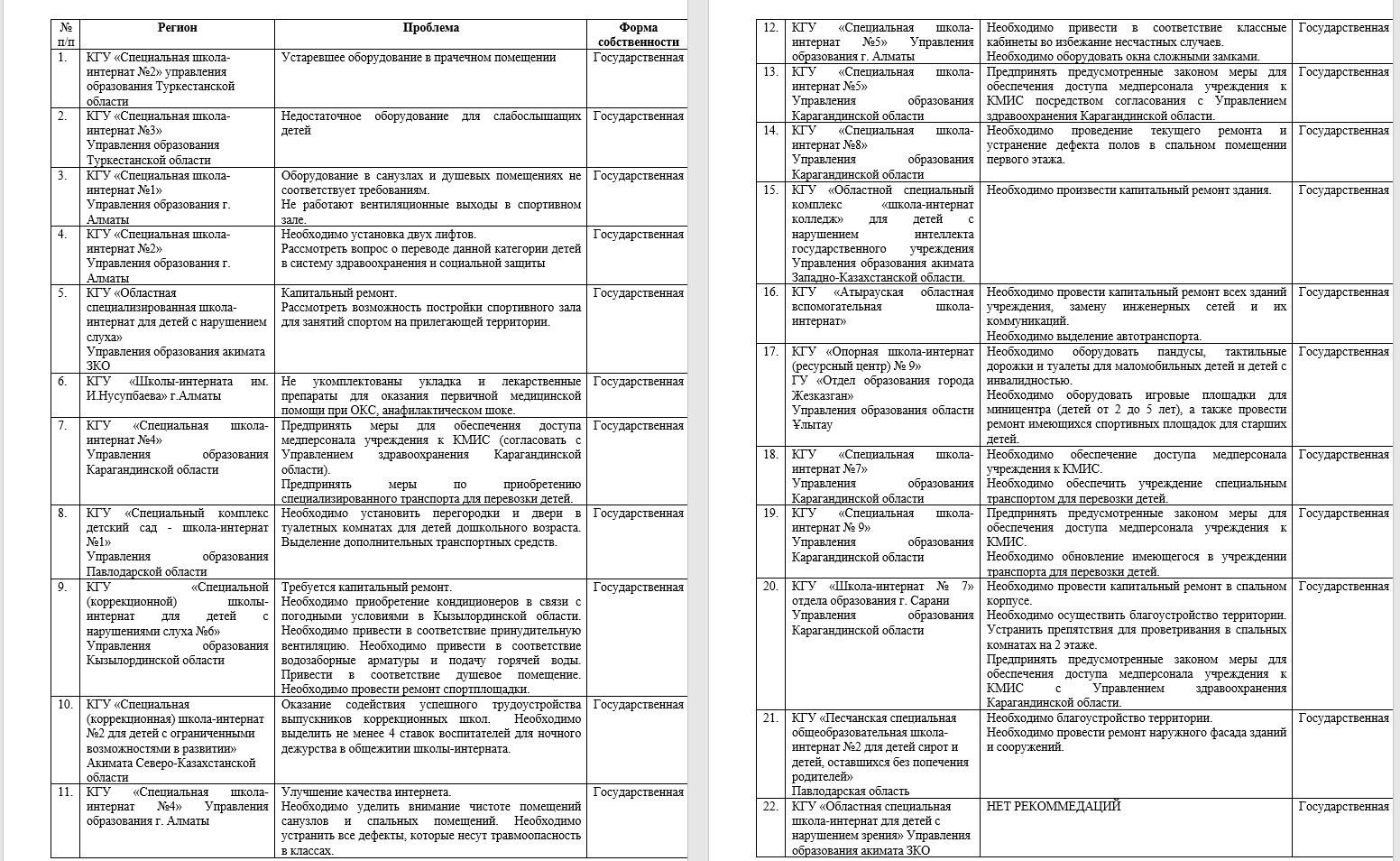
Year after year, expert groups continue to report the same recurring problems in closed institutions:
- Lack of basic hygiene products, including toilet paper
- Outdoor toilets
- No consistent access to clean drinking water
- Absence of laundry facilities
- Poor ventilation indoors
- Low-quality meals
- Failure to follow proper food storage guidelines
- Incomplete or poorly maintained medical records
- Delays in providing medical care
The only institution where inspectors found no violations was the Regional Special Boarding School for Children with Visual Impairments in the West Kazakhstan Region.
Meanwhile, conditions have notably improved in centers for the adaptation of minors and facilities that support children in difficult life circumstances.



The living spaces are cozy, with a thoughtfully chosen color scheme and quality furniture. There’s plenty of room for hobbies and activities, everything is clean, and the rooms are air-conditioned. The recreation areas are well-equipped with games, books, computers, TVs, and various games. There are also proper sports facilities,the report notes.
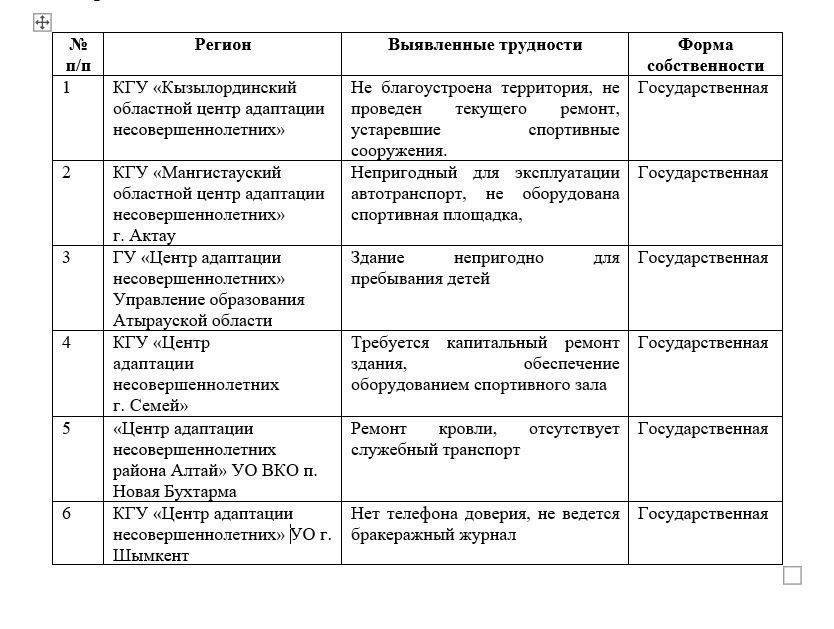
Psychiatric Facilities
During visits to closed medical institutions under the Ministry of Healthcare, the NPM members found that psychiatric facilities are among the worst offenders when it comes to human rights violations.
One of the most notorious examples is the Almaty Mental Health Center — more commonly known as the psychiatric hospital on Kablukov Street — where doctors were previously caught sharing information about vulnerable patients with property, along with their documents and keys, to criminal groups.
The NPM expert group also inspected the Mental Health Center in Novo-Kanaika, East Kazakhstan Region:
The Mental Health Center is in a severely dilapidated condition. There’s no heating or sewage system. The facility is falling apart—inside the departments, cesspools have long replaced functioning toilets, and there is no running water.



The Republican Psychiatric Hospital in the village of Aqtas (Almaty Region), which dates back to 1972, also remains in a state of disrepair. The Qyzylorda Regional Psychiatric Center uses shared toilets without gender separation.
In addition to poor infrastructure, experts are alarmed by outdated treatment practices still in use across the country’s psychiatric institutions.
Mental health centers do not use modern methods of treating schizophrenia and other conditions; they do not use drugs with prolonged action, which could significantly improve patient treatment. They still use obsolete medications. In particular, Chlorpromazine (Aminazin) causes a whole list of side effects and has such contraindications as dysfunction of the kidneys, liver, blood vessels, brain, and spinal cord. When administered intramuscularly, it causes painful subcutaneous lumps. Many European countries abandoned Aminazine in the 1990s due to its high neurotoxicity. European physicians have linked it to seizures, prolonged depression, and life-threatening neuroleptic syndromes, the report notes.
The only positive example in the report was the Arqalyq branch of the Qostanay Regional Mental Health Center, where recent renovations created a clean and bright environment. Patients appeared well-groomed and voiced no complaints.
Children’s Closed Hospitals
The NPM conducted 16 inspections of closed children’s institutions under the Ministry of Health, including 14 specialized orphanages, a facility for children with central nervous system damage, and one anti-tuberculosis facility.
Most of these institutions are housed in outdated buildings that urgently need repairs. Many lack basic accessibility features such as ramps, handrails, and adaptive equipment for children with disabilities. Air conditioners are absent, and split systems are not installed to protect children from drafts.
The Atyrau Regional Children’s Anti-Tuberculosis Sanatorium has no classroom for schoolwork. Children eat, study, and watch TV in the same cramped space. Due to the lack of room in the dormitories, they don't even have bedside tables. The facility has also recorded frequent child injuries.
At the Umit Children’s Home in the Aqtobe Region, children were prescribed medications not included in official treatment protocols. There is also no rehabilitation equipment available for children with neurological movement disorders.
NPM experts also highlighted multiple safety concerns. The specialized children’s home in Oskemen has no functioning security checkpoint, and the equivalent facility in Atyrau has no security at all.
Special Social Service Centers
Another category of institutions visited by the NPM includes special social service centers meant to provide care, rehabilitation, and support to vulnerable populations: the elderly, people with disabilities, the homeless, and others in difficult life situations.
In reality, many centers fail to meet the most basic standards of respect, dignity, and human needs.
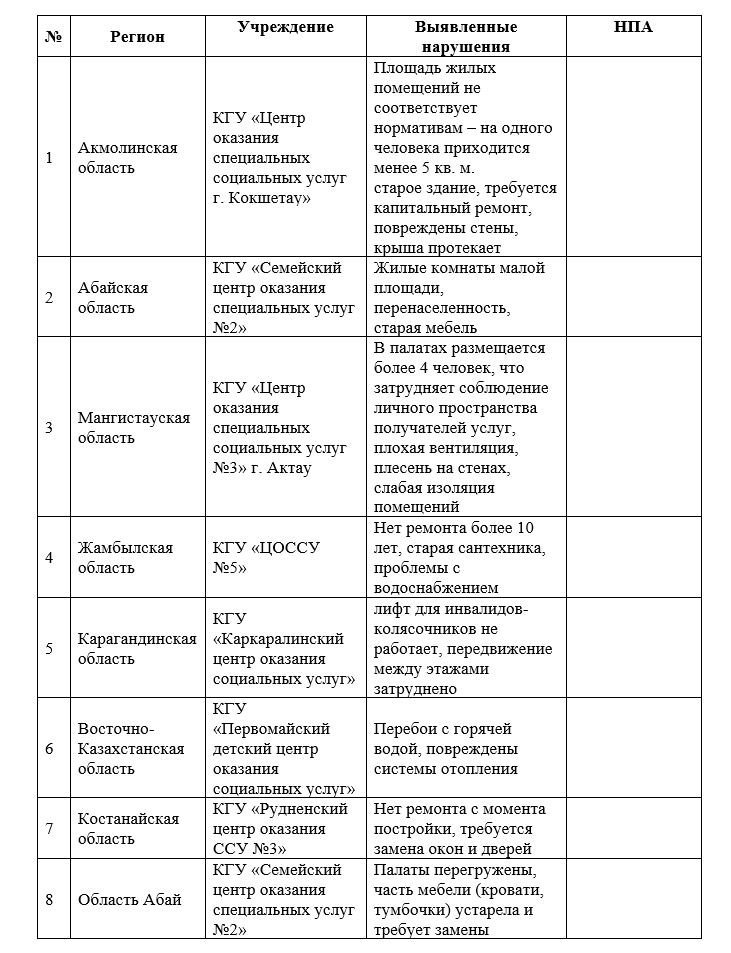
The Special Social Services Center in the Jambyl region is located next to a landfill. The proximity brings constant air pollution, a pungent stench, and the risk of rodents entering the grounds. On dry days, dust from the landfill clogs the building's ventilation system.


In the Jetisu region, a similar center lacks curtains in the bedrooms.
Beds are uneven, and there’s often only one bedside table in an entire room. Although wardrobes exist, they are kept locked. Residents can only access their personal belongings through the staff.




Many centers lack basic accessibility despite housing people with limited mobility.
Medical rooms are also severely under-equipped. Some lack essential items like functional hospital beds, blood pressure monitors, glucometers, ECG machines, or oxygen tanks. Some medical staff don’t follow proper hygiene or medication storage protocols.
Nutrition is another major issue. Food in all facilities is described as extremely poor — prepared with low-quality ingredients, served in small portions, and lacking variety or nutritional value.
Following these visits, reports on potential violations have been forwarded to the prosecutor’s office, relevant ministries, and other state bodies.
Original Author: Aliya Askarova
Latest news
- President Toqayev Sends Nazarbayev Birthday Wishes
- Toqayev Appoints New Ambassadors in Series of Diplomatic Changes
- Unidentified Object Resembling Drone Found in Atyrau Region
- Trump and Zelenskyy Discuss Air Defense Needs
- Rapper Qurt: Wife Withdraws Statement in Court
- Head of Azerbaijani Cultural Autonomy in Moscow Region Reportedly Loses Russian Citizenship
- Defense Secretary Hegseth Paused Ukraine Weapons Shipment Despite Pentagon Assessment — NBC
- Prosecutor General's Office Confirms Detention of Kozhamzharov's Associate in Torture Case
- State to Scale Back Role in Competitive Sectors
- Uzbek Banker Kidnapped in Paris
- Former Financial Police Officials Reportedly Detained, Case Concerns Torture
- Progress MS-31 Launches from Baikonur Carrying Fuel, Water, and Scientific Cargo
- Two Men to Face Trial for Homicide of Missing Atyrau Woman, Body Not Found
- Russia Launched Massive Strike on Ukraine Following Trump–Putin Call
- Rapper Qurt Accused of Abuse by Wife
- Pavlodar Region: Rescuers Seek Lower Retirement Age Amid Strain of Risky Work
- Businessman Vagif Suleymanov Detained in Moscow
- Kashagan Field Reaches One Billion Barrels of Oil Extracted
- Lenin Street in Osh Renamed After 19th-Century Kyrgyz Leader
- New Uranium Plant Launched in Turkistan Region with French Partnership

